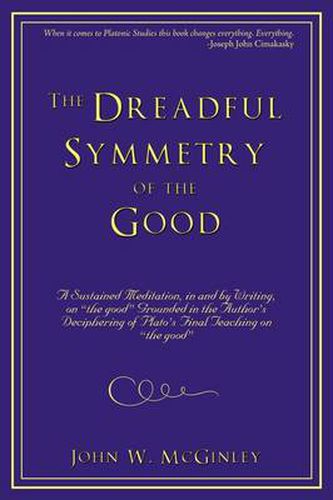Readings Newsletter
Become a Readings Member to make your shopping experience even easier.
Sign in or sign up for free!
You’re not far away from qualifying for FREE standard shipping within Australia
You’ve qualified for FREE standard shipping within Australia
The cart is loading…






This title is printed to order. This book may have been self-published. If so, we cannot guarantee the quality of the content. In the main most books will have gone through the editing process however some may not. We therefore suggest that you be aware of this before ordering this book. If in doubt check either the author or publisher’s details as we are unable to accept any returns unless they are faulty. Please contact us if you have any questions.
Yes, that’s right. The writings of Plato do NOT all fit together in harmony, irrespective of the question of chronological development. To be sure, one is just ice-skating over the surface of Platonic writings if one does not have a nuanced understanding of the various periods of Plato’s intellectual development over time. The incongruity in his writings which is a function of this multi-faceted intellectual development over time can, however, be sufficiently delineated. But there is another kind of incongruity which, especially in Plato’s case, could never be and in fact never was explainable through a nuanced accounting of Plato’s long and ever-revising intellectual development.
The writings of Plato could never have been anything other than incongruous in this more fundamental sense, Plato being Plato. For Plato being Plato, early and or middle and or later, IS precisely this: Plato contra Plato. But more than that, “the good itself” [[i.e., Plato’s eventual teaching on the good and also, in fact, “the good itself” obtaining in and as that wellspring of greatness characteristic of “”“”“reality”“”“” itself]] is precisely the-good contra the-good. The good always and inevitably, and of its own nature, appears to be what it is not. For the good’s very manner of being-at-all is, precisely this appearing-to-be-what-it-is-not.
$9.00 standard shipping within Australia
FREE standard shipping within Australia for orders over $100.00
Express & International shipping calculated at checkout
This title is printed to order. This book may have been self-published. If so, we cannot guarantee the quality of the content. In the main most books will have gone through the editing process however some may not. We therefore suggest that you be aware of this before ordering this book. If in doubt check either the author or publisher’s details as we are unable to accept any returns unless they are faulty. Please contact us if you have any questions.
Yes, that’s right. The writings of Plato do NOT all fit together in harmony, irrespective of the question of chronological development. To be sure, one is just ice-skating over the surface of Platonic writings if one does not have a nuanced understanding of the various periods of Plato’s intellectual development over time. The incongruity in his writings which is a function of this multi-faceted intellectual development over time can, however, be sufficiently delineated. But there is another kind of incongruity which, especially in Plato’s case, could never be and in fact never was explainable through a nuanced accounting of Plato’s long and ever-revising intellectual development.
The writings of Plato could never have been anything other than incongruous in this more fundamental sense, Plato being Plato. For Plato being Plato, early and or middle and or later, IS precisely this: Plato contra Plato. But more than that, “the good itself” [[i.e., Plato’s eventual teaching on the good and also, in fact, “the good itself” obtaining in and as that wellspring of greatness characteristic of “”“”“reality”“”“” itself]] is precisely the-good contra the-good. The good always and inevitably, and of its own nature, appears to be what it is not. For the good’s very manner of being-at-all is, precisely this appearing-to-be-what-it-is-not.